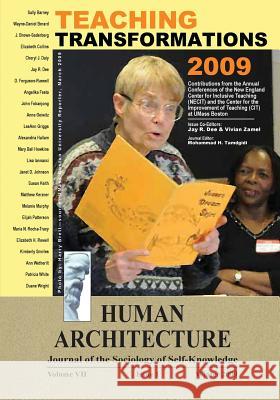Teaching Transformations 2009: Contributions from the Annual Conferences of the New England Center for Inclusive Teaching (NECIT) and the R » książka
Teaching Transformations 2009: Contributions from the Annual Conferences of the New England Center for Inclusive Teaching (NECIT) and the R
ISBN-13: 9781888024326 / Angielski / Miękka / 2009 / 148 str.
Teaching Transformations 2009: Contributions from the Annual Conferences of the New England Center for Inclusive Teaching (NECIT) and the R
ISBN-13: 9781888024326 / Angielski / Miękka / 2009 / 148 str.
(netto: 203,84 VAT: 5%)
Najniższa cena z 30 dni: 204,23
ok. 16-18 dni roboczych.
Darmowa dostawa!
This Winter 2009 (VII, 1) issue of Human Architecture: Journal of the Sociology of Self- Knowledge, entitled "Teaching Transformations 2009" and dedicated to the chronicling of representative experiences of teaching transformation in the New England area and elsewhere, brings together selected proceedings of the annual conferences of the Center for the Improvement of Teaching (CIT) and the New England Center for Inclusive Teaching (NECIT) recently held at UMass Boston. The first seven studies in the issue were gathered through the conference activities of NECIT. The second series of articles emerged from the conversations and presentations at the annual CIT conference at UMass Boston. The contributions have a common interest in advancing teaching and learning practices that transform the self and the world in favor of more just, inclusive, and participatory outcomes. The editors believe that the most central and distinguishing defining features of NECIT and CIT, i.e., the three-fold concerns with promoting pedagogical reflexivity, student learning empathy, and faculty agency, are well advocated for and respresented in the papers shared in this volume. Contributors include: Jay R. Dee (also as journal issue guest editor), Vivian Zamel (also as journal issue guest editor), Cheryl J. Daly, Maria Natalicia Rocha-Tracy, Darlene Ferguson-Russell, John Fobanjong, Patricia White, LeeAnn Griggs, Sally Barney, Janet Brown-Sederberg, Elizabeth Collins, Susan Keith, Lisa Iannacci, Kimberly Smirles, Ann Wetherilt, Melanie Murphy, Elijah Patterson, Janet D. Johnson, Elizabeth H. Rowell, Mary Ball Howkins, Duane Wright, Wayne-Daniel Berard, Alexandria Hallam, Anne Geiwitz, Matthew R. Kerzner, Angelika Festa, and Mohammad Tamdgidi (also as journal editor-in-chief). Human Architecture: Journal of the Sociology of Self-Knowledge is a publication of OKCIR: The Omar Khayyam Center for Integrative Research in Utopia, Mysticism, and Science (Utopystics). For more information about OKCIR and other issues in its journal's Edited Collection as well as Monograph and Translation series visit OKCIR's homepage.
This Winter 2009 (VII, 1) issue of Human Architecture: Journal of the Sociology of Self- Knowledge, entitled "Teaching Transformations 2009" and dedicated to the chronicling of representative experiences of teaching transformation in the New England area and elsewhere, brings together selected proceedings of the annual conferences of the Center for the Improvement of Teaching (CIT) and the New England Center for Inclusive Teaching (NECIT) recently held at UMass Boston. The first seven studies in the issue were gathered through the conference activities of NECIT. The second series of articles emerged from the conversations and presentations at the annual CIT conference at UMass Boston. The contributions have a common interest in advancing teaching and learning practices that transform the self and the world in favor of more just, inclusive, and participatory outcomes. The editors believe that the most central and distinguishing defining features of NECIT and CIT, i.e., the three-fold concerns with promoting pedagogical reflexivity, student learning empathy, and faculty agency, are well advocated for and respresented in the papers shared in this volume. Contributors include: Jay R. Dee (also as journal issue guest editor), Vivian Zamel (also as journal issue guest editor), Cheryl J. Daly, Maria Natalicia Rocha-Tracy, Darlene Ferguson-Russell, John Fobanjong, Patricia White, LeeAnn Griggs, Sally Barney, Janet Brown-Sederberg, Elizabeth Collins, Susan Keith, Lisa Iannacci, Kimberly Smirles, Ann Wetherilt, Melanie Murphy, Elijah Patterson, Janet D. Johnson, Elizabeth H. Rowell, Mary Ball Howkins, Duane Wright, Wayne-Daniel Berard, Alexandria Hallam, Anne Geiwitz, Matthew R. Kerzner, Angelika Festa, and Mohammad Tamdgidi (also as journal editor-in-chief). Human Architecture: Journal of the Sociology of Self-Knowledge is a publication of OKCIR: The Omar Khayyam Center for Integrative Research in Utopia, Mysticism, and Science (Utopystics). For more information about OKCIR and other issues in its journals Edited Collection as well as Monograph and Translation series visit OKCIRs homepage.











